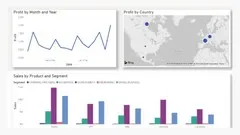
International Business II 
This course, International Business II, provides an in-depth exploration of managing organizations in the international economy. Students will gain an understanding of the global business environment and its implications for business operations. ▼
ADVERTISEMENT
Course Feature
![]() Cost:
Cost:
Free
![]() Provider:
Provider:
Coursera
![]() Certificate:
Certificate:
No Information
![]() Language:
Language:
English
![]() Start Date:
Start Date:
Self Paced
Course Overview
❗The content presented here is sourced directly from Coursera platform. For comprehensive course details, including enrollment information, simply click on the 'Go to class' link on our website.
Updated in [March 06th, 2023]
International Business II is a course that provides students with the knowledge and skills required to successfully operate a cross-border organisation. This course builds on Introduction to the Global Business Environment I and focuses on organisational level and management issues in international settings. Topics covered include foreign currencies and exchange rates, how to organise a business abroad, adapting products and services for the international market, working abroad and managing expatriates, starting, operating and growing a small or entrepreneurial business in the global environment, and the current state of the global business environment.
[Applications]
Students who have completed International Business II can apply their knowledge and skills to a variety of international business settings. They can use their understanding of foreign currencies and exchange rates to make informed decisions about international investments. They can use their knowledge of organizational structures to develop effective strategies for managing international operations. They can use their understanding of product and service adaptation to develop successful international marketing plans. They can use their knowledge of expatriate management to ensure successful international assignments. They can use their knowledge of small and entrepreneurial business to develop and grow international businesses. Finally, they can use their understanding of the current global business environment to make informed decisions about international business opportunities.
[Career Paths]
1. International Business Consultant: International business consultants provide advice and guidance to companies looking to expand their operations into foreign markets. They help companies identify potential markets, develop strategies for entering those markets, and manage the implementation of those strategies. They also provide advice on how to manage the risks associated with international business. Developing trends in this field include the use of technology to facilitate global business operations, the increasing importance of data analytics, and the need for consultants to have a deep understanding of the cultural and legal aspects of international business.
2. International Trade Lawyer: International trade lawyers specialize in the legal aspects of international business. They advise companies on the legal requirements for conducting business in foreign countries, including the laws governing the import and export of goods and services. They also provide advice on international contracts, dispute resolution, and other legal matters related to international business. Developing trends in this field include the increasing complexity of international trade agreements, the need for lawyers to have a deep understanding of the cultural and legal aspects of international business, and the use of technology to facilitate global business operations.
3. International Business Analyst: International business analysts provide analysis and insights into the global business environment. They analyze data from multiple sources to identify trends and opportunities in the global market. They also provide advice on how to best position a company to take advantage of those opportunities. Developing trends in this field include the use of big data and analytics to gain insights into the global market, the need for analysts to have a deep understanding of the cultural and legal aspects of international business, and the use of technology to facilitate global business operations.
4. International Business Development Manager: International business development managers are responsible for developing and executing strategies to expand a company’s presence in foreign markets. They identify potential markets, develop strategies for entering those markets, and manage the implementation of those strategies. They also provide advice on how to manage the risks associated with international business. Developing trends in this field include the use of technology to facilitate global business operations, the increasing importance of data analytics, and the need for managers to have a deep understanding of the cultural and legal aspects of international business.
[Education Paths]
1. Bachelor of Business Administration (BBA): This degree focuses on the fundamentals of business, such as accounting, finance, marketing, and management. It provides students with the skills and knowledge necessary to succeed in the global business environment. Developing trends in this degree include a focus on sustainability, digital marketing, and data analytics.
2. Master of International Business (MIB): This degree focuses on the global aspects of business, such as international trade, foreign exchange, and global strategy. It provides students with the skills and knowledge necessary to succeed in the global business environment. Developing trends in this degree include a focus on global supply chain management, international finance, and international marketing.
3. Master of Science in Global Business (MSGB): This degree focuses on the strategic aspects of global business, such as global strategy, international business law, and global operations. It provides students with the skills and knowledge necessary to succeed in the global business environment. Developing trends in this degree include a focus on global entrepreneurship, global leadership, and global business analytics.
4. Doctor of Business Administration (DBA): This degree focuses on the advanced aspects of business, such as strategic management, international business, and global economics. It provides students with the skills and knowledge necessary to succeed in the global business environment. Developing trends in this degree include a focus on global business ethics, global risk management, and global business strategy.
Pros & Cons

Thoroughly developed content

Personal touch regarding expatriate experience

Interesting knowledge about global environment

Easy to understand concepts

Clarity on next steps to take into global market

References and links to help in further research

Material not updated

Data used is old

Dynamic subject needs to be updated
Course Provider

Provider Coursera's Stats at AZClass
International Business II provides an in-depth look at the management of organizations in the international economy, where learners learn about foreign currencies and how exchange rates are determined. They will learn about the different types of currencies, how they are traded, and how they affect the global economy. They will also learn about the different types of exchange rates and how they are determined. Learners gain an understanding of how to organize an overseas business. They will learn about different types of organizational structures, how to set up a business in a foreign country, and how to manage different aspects of a business. They will also learn about the different legal and regulatory requirements for setting up a business in a foreign country.
Discussion and Reviews
0.0 (Based on 0 reviews)
Explore Similar Online Courses

Art of C Programming

How to Become a Successful Team Leader - 9 Strong Principles

Python for Informatics: Exploring Information

Social Network Analysis

Introduction to Systematic Review and Meta-Analysis

The Analytics Edge

DCO042 - Python For Informatics

Causal Diagrams: Draw Your Assumptions Before Your Conclusions

Whole genome sequencing of bacterial genomes - tools and applications

Business Intelligence Analyst - Power BI Tableau

Create BI Reports with Power BI Using Excel Data


Start your review of International Business II